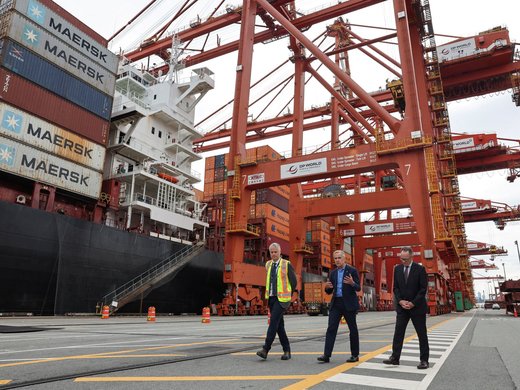From a pure economic perspective, NAFTA could be improved. There are some remaining trade barriers to goods trade, services trade is subject to uncertain market access, the rules of accessing NAFTA’s preferential trade windows are restrictive, and small business would benefit from a more liberal regime for small shipments.
However, a NAFTA renegotiation initiated by a new U.S. Administration would not be framed to liberalize trade, but instead a response to populist demands to recapture jobs for Americans. That demand does not translate into a coherent economic agenda for the United States trade representative to press in talks with Canada.
First, trade tends to improve efficiency — which tends to be job-destroying rather than job-creating. Politicians may talk “jobs, jobs, jobs” when it comes to trade, but trade economists don’t — they tend to avoid the subject. Secondly, insofar as the NAFTA renegotiation were to increase protection in net terms for U.S. producers with the intent of increasing American jobs, this would serve as a tax on U.S. exports and destroy about as many jobs as it creates.
Simply put, renegotiating NAFTA, with the protectionist objectives implicit in the politics of restoring decent jobs for Americans, would be like rearranging deck chairs on America’s sinking ship of economic discontent: useless. Actually, worse than useless. As in the 1930s, just as in the aftermath of Brexit, the injection of new restrictions and heightened uncertainty into trade would result in a welfare-diminishing mutual reduction of exports and imports, and investment.
Absent a coherent economic agenda, the U.S. trade bureaucracy would interpret the mandate to renegotiate NAFTA in terms of addressing the laundry list of outstanding complaints against Canada generated by the well-oiled U.S. trade lobby machine. In the crosshairs would be the following targets:
Intellectual Property
- Canada’s intellectual property enforcement: the U.S. wants Canadian customs officials to detain pirated and counterfeit goods that are in transit or are transhipped through Canada; and Canada to take measures against online marketplaces “reportedly” engaging in commercial-scale piracy online, including sites hosted in, operated by, or directed toward parties located in Canada;
- Canada’s administrative procedures for approval of pharmaceuticals: the U.S. wants Canada to eliminate rights of appeal in Canada’s administrative process for approval of pharmaceuticals: the U.S. wants Canada to eliminate rights of appeal in Canada’s administrative process for reviewing regulatory approval of pharmaceutical products and to restrict the Health minister’s discretion in disclosing confidential business information;
- Utility requirements for patents: the U.S. is pressing for a “clarification” of the Supreme Court of Canada’s decision concerning heightened utility requirements for patents to meet American stakeholder asks;
- Canada’s geographical indications commitments under the Canada-EU Economic and Trade Agreement (CETA): the U.S. wants to ensure that Canada’s concessions to the EU to protect names like parmesan and feta do not restrict U.S. exports to Canada.
Agricultural Market Access
- Dairy market access: a small flash point is imports of milk proteins that are coming into Canada through a duty free window (“diafiltered”). The U.S. will contest a Canadian response that lowers milk prices for producers of manufactured dairy products to patch this hole in the supply management program. A bigger issue is the interpretation of the TPP’s dairy market access provision: the U.S. International Trade Commission study of the TPP projects $1.2-billion (US) of dairy exports to Canada, substantially more than the Canadian government concedes it negotiated away in the CETA and TPP combined;
- Wheat market access: the Canada Grains Act and Varietal Registration System is a point of friction for U.S. wheat exporters as it does not allow American wheat that has not been tested for compliance with Canadian regulations to be graded according to Canadian standards. Bill C-48, “Modernization of Canada’s Grain Industry Act”, which would have overhauled the Canadian Grain Commission practices but was shelved with the change in Canadian government, would be a U.S. target.
Government Procurement
- Canada extended unprecedented access to sub-national procurement to the EU under CETA; the U.S. will want the same; access to an expanded list of Crown Corporations is featured in the U.S. Market Access Barriers report on Canada;
- National security-based restrictions on cross-border data flows for management of Canada’s federal email system;
- Quebec Hydro local content requirements (which are not covered by government procurement agreements).
Canada’s Industrial Policy
- Softwood lumber – again;
- Canadian support to the aerospace sector;
- Telecommunications restrictions on foreign direct invest;
- Canadian content in broadcasting requirements;
- Canada’s net benefit test under the Investment Canada Act.
If NAFTA renegotiation actually resulted in genuine liberalization by Canada, it should be a good thing for the country. Conventional economic theory — which is reflected in empirical models that seek to quantify the impact of trade agreements — says that liberalizing markets enables a more efficient allocation of resources, higher incomes, and generally greater economic welfare for both parties — even if only one side liberalizes.
The items on the U.S. negotiating list, however, are not necessarily trade liberalizing. The first specific item in the current softwood lumber review, for example, is a commitment “to maintain Canadian exports at or below an agreed U.S. market share to be negotiated.”
The U.S. is not being hypocritical; it is just doing business. There is a difference. Hypocrisy is about principles. Business is about self-interest — in this case, the self-interest of stakeholders.
The rub is that self-interest of individual stakeholders does not translate into national interest.
The hard cases — dairy, telecommunications ownership, aerospace support, and Canadian content in media — would not likely crack. The other items would not register on the GDP Richter scale. So however one characterizes a U.S. approach to NAFTA renegotiation, Canada would not feel the earth move as a result. The exercise would be one of damage control for negotiators and finding a reason to be somewhere else when ministers announce with forced smiles how they have improved NAFTA.
This article originally appeared in The Hill Times.


